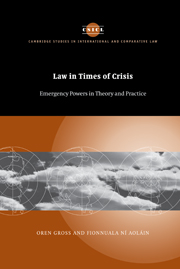Introduction
Published online by Cambridge University Press: 03 September 2009
Summary
The terrorist attacks of September 11, 2001 and the ensuing “war on terror” have focused much attention on issues that have previously lurked in a dark corner at the edge of the legal universe. Politicians and academics alike are now preoccupied with a wide range of questions about the possible responses of democratic regimes to violent challenges. The resort to emergency powers at both the national and international level has been so extensive and penetrating that the exercise of these powers and the complex questions that arise in that connection now play a critical role in discussions about the rule of law, legitimacy, and legality.
Despite repeated statements that the events of September 11 have forever changed the world, much of the discussion around matters dealing with terrorism, the structuring of counter-terrorism measures, extraordinary governmental powers to answer future threats, and fashioning legal responses to terrorist threats is not new. As this book illustrates throughout, the quandaries posed by defining and structuring responsible responses to crises did not begin with the events of September 11. They have faced nations embroiled in wars against external enemies, as well as those responding to violent movements within their own borders. They have haunted countries powerful and weak, rich and poor.
- Type
- Chapter
- Information
- Law in Times of CrisisEmergency Powers in Theory and Practice, pp. 1 - 14Publisher: Cambridge University PressPrint publication year: 2006



